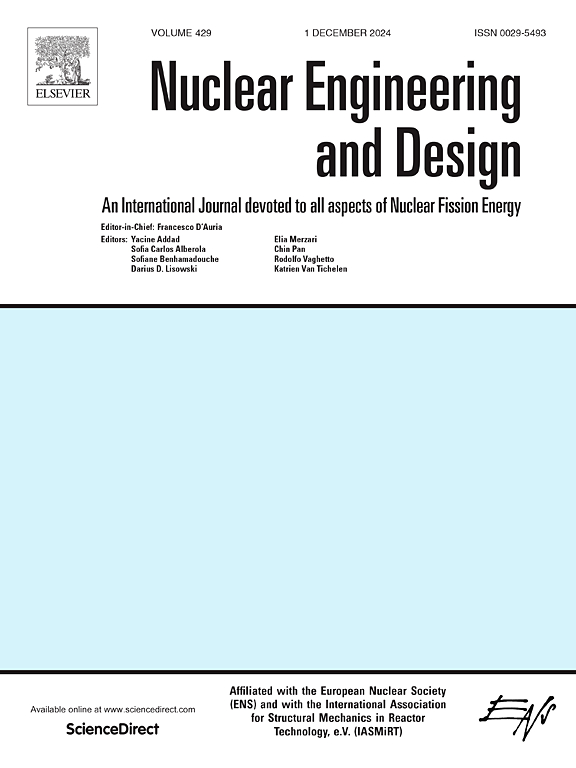Uncertainty-aware prediction of Peak Cladding Temperature during extended station blackout using Transformer-based machine learning
IF 1.9
3区 工程技术
Q1 NUCLEAR SCIENCE & TECHNOLOGY
引用次数: 0
Abstract
Accurate prediction of the Peak Clad Temperature (PCT) may be used to evaluate the efficacy of operator mitigation actions during extended Station Blackout (SBO) scenarios. In this study, we propose a two-stage machine learning (ML) framework that integrates classification and regression to forecast PCT. While the classification stage identifies whether mitigation efforts succeed or fail, the regression stage provides precise multi-step PCT predictions. Our framework leverages advanced ML models, including Transformer architectures, Attention mechanism, and Long Short-Term Memory (LSTM) networks, alongside the Best Estimate Plus Uncertainty (BEPU) approach. To account for the underlying uncertainty and generate confidence intervals, we incorporate Monte Carlo (MC) Dropout. By integrating BEPU with machine learning and uncertainty quantification, our model produces reliable temperature forecasts despite the system’s inherent complexity and nonlinearity with R2 values exceeding 0.98 for 60-, 120-, and 240-step time frames. Notably, the LSTM-Transformer model proves to be the most effective, even for longer prediction horizons. The developed framework serves as a powerful real-time decision support tool for operators, for accurate prediction and effective mitigation of critical conditions like extended SBO events.
基于变压器的机器学习的扩展站停电时峰值包层温度的不确定性预测
准确预测峰值包层温度(PCT)可用于评估运营商在延长站停电(SBO)情景下缓解措施的有效性。在本研究中,我们提出了一个两阶段的机器学习(ML)框架,该框架集成了分类和回归来预测PCT。分类阶段确定缓解工作是否成功,回归阶段提供精确的多步骤PCT预测。我们的框架利用了先进的机器学习模型,包括Transformer架构、注意力机制和长短期记忆(LSTM)网络,以及最佳估计加不确定性(BEPU)方法。为了考虑潜在的不确定性并产生置信区间,我们纳入了蒙特卡罗(MC) Dropout。通过将BEPU与机器学习和不确定性量化相结合,尽管系统固有的复杂性和非线性(60步、120步和240步时间框架的R2值超过0.98),我们的模型仍能产生可靠的温度预测。值得注意的是,LSTM-Transformer模型被证明是最有效的,即使在更长的预测范围内也是如此。开发的框架为作业者提供了强大的实时决策支持工具,用于准确预测和有效缓解扩展SBO事件等关键条件。
本文章由计算机程序翻译,如有差异,请以英文原文为准。
求助全文
约1分钟内获得全文
求助全文
来源期刊

Nuclear Engineering and Design
工程技术-核科学技术
CiteScore
3.40
自引率
11.80%
发文量
377
审稿时长
5 months
期刊介绍:
Nuclear Engineering and Design covers the wide range of disciplines involved in the engineering, design, safety and construction of nuclear fission reactors. The Editors welcome papers both on applied and innovative aspects and developments in nuclear science and technology.
Fundamentals of Reactor Design include:
• Thermal-Hydraulics and Core Physics
• Safety Analysis, Risk Assessment (PSA)
• Structural and Mechanical Engineering
• Materials Science
• Fuel Behavior and Design
• Structural Plant Design
• Engineering of Reactor Components
• Experiments
Aspects beyond fundamentals of Reactor Design covered:
• Accident Mitigation Measures
• Reactor Control Systems
• Licensing Issues
• Safeguard Engineering
• Economy of Plants
• Reprocessing / Waste Disposal
• Applications of Nuclear Energy
• Maintenance
• Decommissioning
Papers on new reactor ideas and developments (Generation IV reactors) such as inherently safe modular HTRs, High Performance LWRs/HWRs and LMFBs/GFR will be considered; Actinide Burners, Accelerator Driven Systems, Energy Amplifiers and other special designs of power and research reactors and their applications are also encouraged.
 求助内容:
求助内容: 应助结果提醒方式:
应助结果提醒方式:


